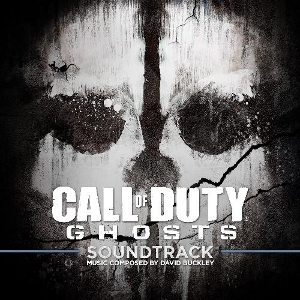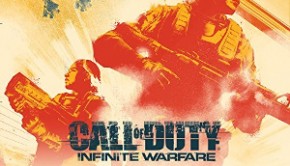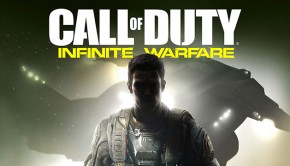Call of Duty -Ghosts- Soundtrack
 |
Album Title: Call of Duty -Ghosts- Soundtrack |
| Record Label: Activision |
|
| Catalog No.: N/A |
|
| Release Date: November 5, 2013 |
|
| Purchase: Download at iTunes |
Overview
At the start of 2013, Infinity Ward asked Remote Control Productions’ David Buckley (The Good Wife, The Town) to entirely score Call of Duty: Ghosts after Harry Gregson-Williams said he was too busy to contribute. In his first major game score, Buckley generally followed Hollywood convention to create a moody electro-orchestral score. To coincide with the game’s release later in 2013, Activision released a 35 track soundtrack album featuring the game’s music on iTunes. It’s become something of a past-time for soundtrack critics to lambaste the productions of Remote Control Productions, just as it has for gamers to bash Call of Duty. However, I went into listening to Call of Duty: Ghosts with an open mind having enjoyed some Remote Control Productions’ scores (e.g. Skylanders: Swap Force, inFamous 2, Metal Gear Solid 4) and Call of Duty’s soundtracks (e.g. Black Ops, Black Ops II, Modern Warfare 3) previously. But what I heard was more than just disappointing…
Body
Setting the bar low for the rest of the score, the main theme for Call of Duty: Ghosts lacks any of the iconic qualities one would expect from a Call of Duty theme. Reflecting Buckley’s desire to create a restrained score, the melody certain isn’t of the hummable sort and instead focuses on conveying the mood of the game; the alternating rises and falls of its phrases provide a hint of hope, while continually throwing listeners back into the bleak reality of the post-apocalyptic setting. While this is all fine, the way the melody is orchestrated and produced removes almost all of the intended effect. Buckley incorporates every Remote Control Productions stereotype here in the most boring of ways; the melody is presented in succession from a moody strings, to an electronic cello, to a more heroic trumpet section above ever-repeating bass line and percussion parts. The resultant soundscape trades the brightness of Brian Tyler’s Modern Warfare 3 or grit of Sean Murray’s Black Ops in favour of monotone, aseptic sounds. A Hungarian session orchestra was apparently used to record the soundtrack, but the instruments have been so overprocessed that no hint of humanity remains; when combined with the sampled electronic and percussion parts, the track sounds like a muddy mess. The only emotion the theme left in me was despair — not for the game’s protagonist, but for the series’ musical downturn.
A large proportion of Call of Duty: Ghosts‘ soundtrack sets the scene with tense ambient underscore. For example, “Liberty Wall” blurs boundaries between music and sound design to create plenty of suspense; but approaching this soundtrack more like a craftman than an artist, Buckley did not try anything particularly experimental here and instead recreated timbres heard hundreds of times previously on Hollywood scores. “Rorke Files” is two minutes of nothingness: a cello alternates between three notes, some electronic ambience drones away, and a panflute gives an occasional contrived wail in the background. Clichéd infiltration grooves also manage to raise their ugly heads in the equally unimpressive “Computer Hack” and “Stealth Kill”. While “Ghost Stories” occasionally delves into musically ambiguous territories, Buckley ruins it by shifting back into predictable, heavy-handed orchestrations for military brass and snares. All of these cues helped to cement my impression of Ghosts‘ soundtrack as a very disappointing leap backwards for the series. As someone with synaesthesia, I associate the visceral Black Ops with reds, vibrant Modern Warfare 3 with blues, and the multifaceted Black Ops II with a whole spectrum of colour. Ghosts, on the other hand, neither has much shade nor hue. Instead, the music makes me imagine a dull, unaesthetic grey from start to finish.
The action tracks bring some variety to the experience, but aren’t particularly wholesome efforts either. In a welcome contrast to the likes of “Rorke Files”, “Loki Combat” is a cue that actually has some plenty of motion. However, it also pretty much defines the generic action theme with its forceful trumpet leads, soaring violin countermelodies, and shifts in intensity. For all its might in its treble register, the accompaniment here is also particularly uninspired — marcato strings repeating the notes and chuggering rhythms over and over. The other action cues on the score also adhere closely to conventions. Whether the Inception-style brass booms of “Severed Ties”, the brutal tremolo strings of “Trench Run”, or syncopated rhythmic structures of “Federation Base”, seasoned soundtrack collectors can be sure they’ve heard all the features here many times before in much better scores. After the varied and melodic battle themes of Black Ops II, these stale, hackneyed themes represent another regression for the franchise. Once again, Buckley’s ruthlessly-efficient, by-the-books approach delivered a range of tracks that serves as passable background music, but fails to leave any lasting impression either in context or on a stand-alone basis.
Despite the ambitious scope of Call of Duty: Ghosts‘ campaign, Buckley doesn’t take listeners on much of a journey here. Whereas Wall’s Black Ops II took listeners on a vibrant tour of the world, the protagonist of Ghosts sounds like he was stuck in a dark, suffocating box when he visits Los Angeles (“Beach Invasion”), Caracas (“Northern Andes Mountains”), and Antarctica (“Atlas Falls”). There’s not much of a spiritual journey either. Rather than exploring the emotional undercurrent of Logan and Riley’s stories, Buckley focuses almost all his attention on offering moody, nondescript underscore or brash action music. Tracks such as “Odin” and “End of the Line” are a little more rousing in context, but still lack the substance or detail to leave a stand-alone impression. The sole emotional centrepieces of the soundtrack are provided by the biggest reprises of the main theme, the elegaic piano and strings cue “San Diego Burning” and the victorious yet reflective finale “Legends Never Die”. They have a lot more substance than the other tracks here, with the latter especially developing over its five minute playtime with genuine cinematic flair. They still prove a little troublesome with their contrived presentation of the melody, adherence to cinematic clichés, and yet more murky, overprocessed orchestration. Still, I’d still take this slushy fodder to the other 94% of the tracks.
Despite being shorter than the last two Call of Duty scores, Ghosts‘ soundtrack release gives the impression of being the most bloated of the series. This is largely because the music itself is so insubstantial that it can’t possibly sustain 74 minutes of intense listening. The tracks could have been a pile of tension and action themes selected from a commercial library; while they all share the basic Remote Control Productions electro-orchestral sound, there’s little that uniquely ties them to Call of Duty: Ghosts or each other. There’s no overriding sense of building towards something here, since the various cues are so similar regardless of their position on the soundtrack; the introductory “Loki Chase” and climactic “Train Chase” are near-identical in timbre, texture, and structure. If I put these tracks on shuffle, I wouldn’t lose much of the experience. Despite this, the stand-alone soundtrack is still quite rocky given its switches between ambience and action rapidly and aimlessly. An abundance of brief cues such as “Threnody”, “No Man’s Land Battle”, “Birds of Prey”, and “Ghost Kill” also distract from any sense of progression; they set scenes fine in the game, but are too insubstantial in length and otherwise to leave a stand-alone impression. All these problems made the experience of listening to Call of Duty: Ghosts‘ soundtrack not just disappointing to this reviewer, but also extremely arduous.
Summary
Whenever I review, I ask myself three big questions to ensure I am giving a balanced perspective of a range of levels and doing a score justice. I did exactly the same with Call of Duty: Ghosts and asked: “Is the soundtrack memorable and emotional on a stand-alone level?” No. “Is the score well-integrated and meaningful in context?” No. “Is the music creatively styled and competently produced?” No. Sadly, this is a soundtrack that completely lacks ambition, colour, or refinement. After Sean Murray, Brian Tyler, and Jack Wall all brought the series’ music forward in different ways, Call of Duty: Ghosts represents a massive step back for the franchise with its unmemorable themes, by-the-numbers stylings, poor production, and uninspired context. It isn’t just the worst Call of Duty score I have reviewed, but also one of the most boring and unfulfilling soundtracks I have forced myself to listen through.
Do you agree with the review and score? Let us know in the comments below!
1.6
Posted on April 11, 2014 by Chris Greening. Last modified on April 24, 2014.















I cannot agree with this review more, the soundtrack was so disappointing. They were on such a good streak too, and David is in no way a mediocre composer AT ALL, he is damn good, but as you said, he really restrained himself here.
Also, don’t get me started on the game. Oh god, such a huge disappointment. I was really looking forward to the campaign, due to Stephen Gaghan penning it, but man, it couldn’t be more uninteresting and shallow. The dialogue was really strong in my opinion, that didn’t feel cheesy at all. Especially the ones during the awesome loading screen. Otherwise, it was so lackluster. The only section that stood out was when you went dark on one of the missions. It really felt like you were a ghost!
Relieved in many ways that you feel the same, as I know we don’t always see eye-to-eye on the Remote Control Productions. The Call of Duty scores have always interested me in some way till now, and my reviews of Black Ops and Modern Warfare 3 were positive; not because they were ground-breaking, but because they were emotional, memorable, and well-produced. Not the same for Ghosts in my opinion.
I’ve honestly not listened to David Buckley’s other works. But as I’ll say in a new article I’m preparing, I think the reason I hated scores like this and Gears of War: Judgment is not because the Remote Control Productions composers are bad. But rather, they’re given uninteresting briefs by the game producers and treat these scores as side-projects to their film works. I find it interesting that Hans Zimmer has not composed a single full score despite his employees working on most franchises; his company clearly regards games as second-best.
“they’re given uninteresting briefs by the game producers and treat these scores as side-projects to their film works.”
I agree, something similar definitely happened with Army of Two The Cartel, Brian really thought of it as a side project. Which is weird as he gave Assassin’s Creed IV, Need for Speed The Run, Far Cry 3 and MW3 a lot of attention. This is the thing I hate the most when they go with a hollywood composer.
I am impressed by Nathan Johnson and Daniel Licht though, those guys are terrific!
Also, totally unrelated, but holy shit did you know Brian Tyler Composed the opening theme for the Sleepy Hollow TV SHOW? I was wondering why it is so damn good! 😀